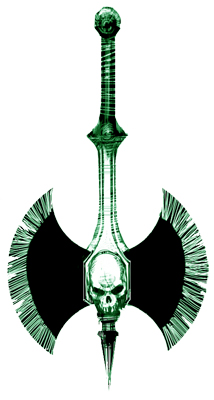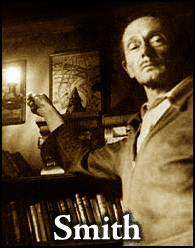The Cimmerian V2n6 — December 2005

Edited by Leo Grin | Illustrated by Jae Woo Kim
40 pages
This issue was printed in two editions. The deluxe edition, numbered 1–75, uses a black linen cover with foil-stamped emeraude text. The limited edition, numbered 76–225, uses an emeraude cover with solid black text.
DELUXE COPIES DESTROYED: 9
LIMITED COPIES DESTROYED: 58
Features a comprehensive guide to collecting REH in the Necronomicon Press, an article on the Three Musketeers of Weird Tales and the Oedipus Complex, another article about Howard’s sanity and eccentricities, poetry, The Lion’s Den, and more.
EXCERPTS:
Glenn Lord says in one introduction that the exchange with Lovecraft was “without doubt the major Howard correspondence.” NP claimed “the letters to Lovecraft alone are worth the price of the volume, as they show us that Howard could easily match — and sometime even surpass — Lovecraft in the art of written debate.” One suspects Joshi was on vacation on the other side of the world when this was slipped in.
— from “Robert E. Howard in the Necronomicon Press” by John Haefele
This despondency sounds much more like clinical depression, such as is described by William Styron in the book that he wrote about his own very deep depression, Darkness Visible. If as we suspect Howard was suffering from clinical depression — like gut fear or panic, clinical depression is intolerable to endure at full force for very long — and given that he knew that his mother was dying, it is not surprising that under the circumstances he committed suicide. I personally doubt that any Oedipal element had anything to do with it.
— from “In Defense of ‘Little Boys'” by Donald Sidney-Fryer
And he writes. Many times, while Paula was off at a convention or out of state for religious instruction, I’ll hang out at one of our greasy spoons to read and write about Howard. The Walkin’ Talkin’ Man will often be in the booth next to me, with a dusty Bible open, scrawling frantically with a cramped and tiny penmanship on top of the Bible’s print until the page is an illegible mass of typesetting, handwriting, and mysterious charts and graphs. He’s obsessive, filling page after page after page as I watch. The Walkin’ Talkin’ Man has to write, just as Howard had to write, eighteen or more hours a day, narrating his stories aloud as he set them down.
— from “At the Mammaries of Madness” by Rick McCollum
A thousand gods were kept in darkness,
A thousand gods of wood and stone,
The greater gods electrum gilded,
The greatest made of gold alone.
— from “The Unseen Gods of Ancient Egypt” by Stanley C. Sargent
As Gary would have it in “Napoleon’s Triumph?”, de Camp “was too much of a pro to write solely for sycophants and hero-worshippers, he was much more interested in unearthing the whole man, warts and all.” But Gary’s pro wasn’t all that interested in unearthing the whole writer. If we review page 401 of DVD, which indexes words beginning with the letter “W,” the alphabetized sequence jumps from “Women (see also Ideal woman; Sex)” to “World War I.” Think about that for a moment, unless you’re Gary and would prefer not to. In a 402-page, purportedly definitive biography, de Camp could not be bothered to include a single reference to “Worms of the Earth,” let alone discuss what is arguably Howard’s finest story, and inarguably one of his finest. The presence of index items for “The Flame-Knife,” “Hawks over Shem,” “The Bloodstained God,” and “The Road of Eagles,” but not “Worms of the Earth” is a grotesque pratfall.
— Steven Tompkins, writing in The Lion’s Den




